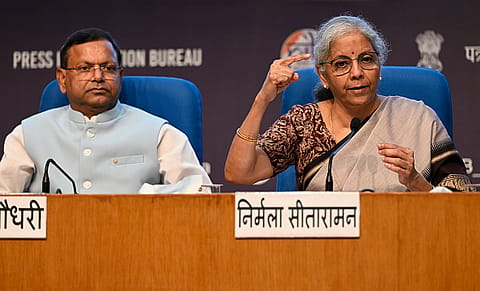No timeline for comprehensive crypto regulations in India: FinMin
The govt says it will continue to evaluate risks and collaborate with international bodies; stakeholders say a defined regulatory environment important both for innovation and investors' protection

The government has clarified that there's no timeline anticipated for the introduction of "comprehensive regulatory guidelines" for the virtual digital assets industry in India. However, India, along with other countries, is expected to evaluate country-specific characteristics and risks, and engage with standard-setting bodies and the G20 to around consider necessary measures for crypto assets, the government told the Lok Sabha today.
"Virtual Digital Assets (VDAs) are by definition borderless and require international collaboration to prevent regulatory arbitrage. Therefore, any comprehensive regulatory framework on the subject can be effective only with significant international collaboration on evaluation of the risks and benefits and evaluation of common taxonomy and standards," Minister of State in the Ministry of Finance, Pankaj Chaudhary, stated in the Lok Sabha.
Indian government’s approach to crypto also remains “cautious”. Cryptos are not regulated in India, meaning investors trade at their own risk. The government says it has no plans to bring a law to tax crypto transactions -- though there's a 30% tax on overall profit and 1% TDS -- leaving its future uncertain in India.
Notably, the government in March 2023 had brought digital assets under the purview of the Prevention of Money Laundering Act, 2002 (PMLA). Income from these assets is also taxed under the Income-tax Act, of 1961, and different aspects of the VDA sector are regulated under the Information Technology Act, of 2000, and the Companies Act, of 2013. During India’s Presidency of the G20 last year, the International Monetary Fund (IMF) and Financial Stability Board (FSB) Synthesis Paper, along with the ‘G20 Roadmap on Crypto Assets,’ was also adopted. The paper provides a comprehensive policy and regulatory framework for crypto assets, addressing risks, including those specific to emerging markets and developing economies.
Chaudhary says though this process involves the introduction of a "discussion paper" on digital assets, there's no definitive time. "A part of such a process may involve the publication of a discussion paper to obtain feedback on the stance or various stances under consideration by jurisdictions. However, there is no specific timeline for any step in the process, including the publication of the discussion paper, as it may only be published after such stance or stances are determined based on the evaluated risks," the minister says.
The minister says the need to balance "investor protection and innovation" must be assessed in light of the broader objective of protecting the Indian economy from the risks posed by the virtual digital assets sector while maintaining the financial and monetary stability of the economy. "Moreover, due to the cross-border and digital nature of this sector, investor protection measures can only mitigate certain risks to a limited extent and cannot eliminate them."
Industry stakeholders say they welcome the Centre's approach towards engaging with stakeholders, but there's a lot that needs to be done. Manhar Garegrat, country head, of India & Global Partnerships, Liminal Custody, says India's proactive stance on regulating virtual digital assets is a commendable step but a comprehensive regulatory framework is still essential to fully harness the potential of this burgeoning industry. "India has been a global leader in cryptocurrency adoption for two consecutive years, as highlighted by Chainalysis' Global Crypto Adoption Index. With the highest global adoption rate at 29%, India outpaces major markets like the United States, which stands at 17%. Establishing a clear and supportive regulatory environment would not only safeguard millions of investors but also solidify India’s position as a global powerhouse in the digital asset space."
Recommended Stories
Shivam Thakral, CEO of homegrown exchange BuyUcoin, says the defined regulatory environment will be important both for innovation and investors' protection. "The current engagements with the stakeholders reflect well the government's commitment to understanding the unique challenges within the VDA sector. We have a lot of hope for global collaboration in the areas where VDAs require borderless and cooperative efforts to avoid the risk of regulatory arbitrage. The involvement of industry stakeholders and regulators will help ensure the safeguarding of investors' interests while promoting growth and innovation within the space of cryptocurrencies."
Sumit Gupta, co-founder, CoinDCX, says during India’s G20 presidency, significant milestones such as the adoption of the IMF-FSB synthesis paper and the G20 roadmap on crypto assets highlighted the critical importance of assessing and mitigating risks associated with crypto assets. "We are eager to actively contribute to shaping a robust regulatory framework that ensures innovation, transparency, and security."